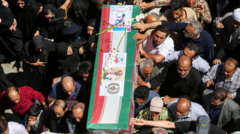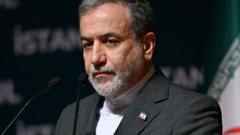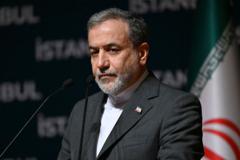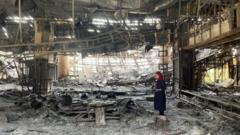The comments come after recent US airstrikes on Iranian nuclear sites and highlight a complex geopolitical landscape involving multiple stakeholders.
**Trump's Controversial Remarks: ‘Absolutely’ Open to Bombing Iran Again**

**Trump's Controversial Remarks: ‘Absolutely’ Open to Bombing Iran Again**
Former President Donald Trump's bold statement about potential military action against Iran raises questions amid escalating tensions.
In a recent press briefing, former President Donald Trump openly stated he would "absolutely" consider military strikes against Iran again, particularly if intelligence suggests that the country could enhance its uranium enrichment to concerning levels. This statement comes in the wake of heightened unrest in the region, especially after the US's involvement in targeting Iranian nuclear facilities with airstrikes.
Last weekend, the US launched significant strikes on key Iranian nuclear sites, using "bunker buster" bombs before President Trump quickly outlined a desire for a ceasefire, indicating a tumultuous escalation in US-Iran relations. Iran’s Supreme Leader, Ayatollah Ali Khamenei, dismissed the effectiveness of these airstrikes in a speech, claiming they had not yielded significant results. Conversely, Trump reiterated his assertions that these strikes had "obliterated" Iran's nuclear sites.
In his posts on the social media platform Truth Social, Trump asserted he possessed detailed intelligence regarding Khamenei's location and disclosed that he had intervened to prevent military actions against the Iranian leader during the conflict. While both nations declared victory through their respective narratives, Iranian officials admitted that the recent attacks resulted in "excessive and serious damage" to their nuclear infrastructure.
Khamenei’s claims of success have been met with skepticism from Trump, who questioned the validity of the Iranian leader’s statements, characterizing them as disingenuous. He also expressed that his initiatives to explore sanction relief against Iran were halted following Khamenei’s provocative remarks.
The skirmishes began following Israel's targeted strikes on Iranian nuclear and military sites, resulting in casualties on both sides—610 fatalities reported in Iran and 28 in Israel. Israeli Prime Minister Benjamin Netanyahu emphasized the dire necessity of neutralizing Iran's perceived impending nuclear capabilities.
Despite diplomatic overtures suggested by the White House, including potential support for non-enriched, civilian nuclear endeavors, Iranian leadership remains steadfast in denying any intentions to resume negotiations with the US.
With the conflict intensifying, the dynamic between the US, Iran, and Israel presents a complex web of political maneuverings and military posturing, reflecting an intricate balancing act in international relations.
Last weekend, the US launched significant strikes on key Iranian nuclear sites, using "bunker buster" bombs before President Trump quickly outlined a desire for a ceasefire, indicating a tumultuous escalation in US-Iran relations. Iran’s Supreme Leader, Ayatollah Ali Khamenei, dismissed the effectiveness of these airstrikes in a speech, claiming they had not yielded significant results. Conversely, Trump reiterated his assertions that these strikes had "obliterated" Iran's nuclear sites.
In his posts on the social media platform Truth Social, Trump asserted he possessed detailed intelligence regarding Khamenei's location and disclosed that he had intervened to prevent military actions against the Iranian leader during the conflict. While both nations declared victory through their respective narratives, Iranian officials admitted that the recent attacks resulted in "excessive and serious damage" to their nuclear infrastructure.
Khamenei’s claims of success have been met with skepticism from Trump, who questioned the validity of the Iranian leader’s statements, characterizing them as disingenuous. He also expressed that his initiatives to explore sanction relief against Iran were halted following Khamenei’s provocative remarks.
The skirmishes began following Israel's targeted strikes on Iranian nuclear and military sites, resulting in casualties on both sides—610 fatalities reported in Iran and 28 in Israel. Israeli Prime Minister Benjamin Netanyahu emphasized the dire necessity of neutralizing Iran's perceived impending nuclear capabilities.
Despite diplomatic overtures suggested by the White House, including potential support for non-enriched, civilian nuclear endeavors, Iranian leadership remains steadfast in denying any intentions to resume negotiations with the US.
With the conflict intensifying, the dynamic between the US, Iran, and Israel presents a complex web of political maneuverings and military posturing, reflecting an intricate balancing act in international relations.





















